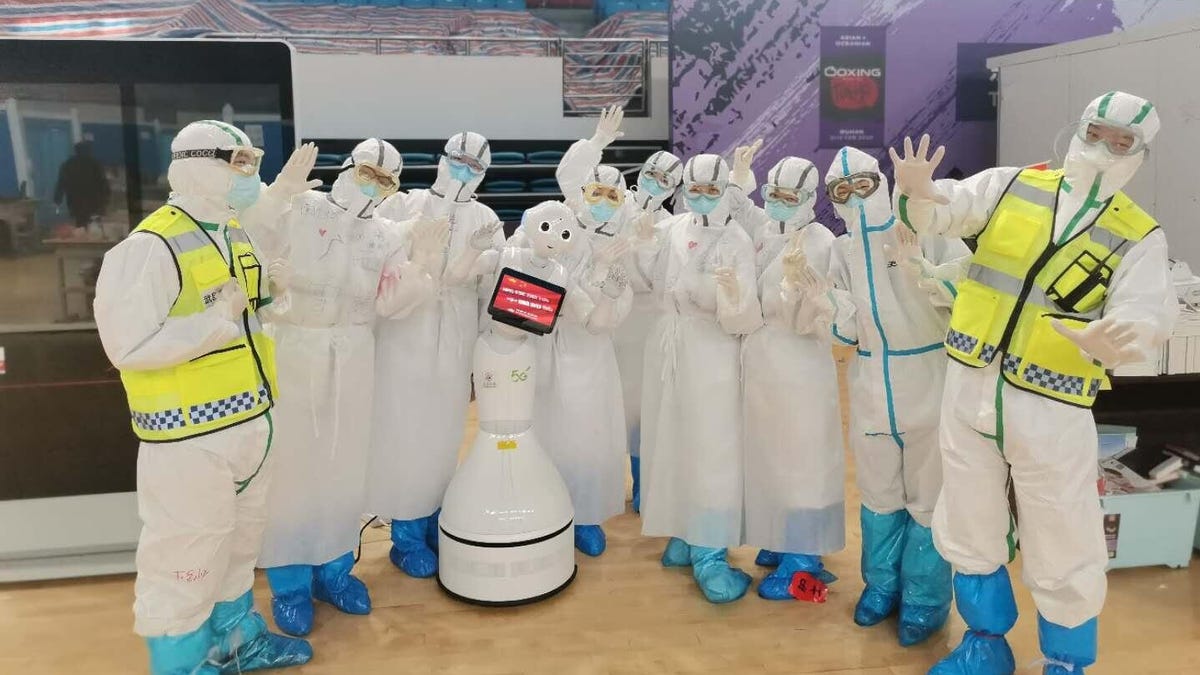Coronavirus care at one hospital got totally taken over by robots
At a smart hospital in Wuhan, China, robots stepped in to take vital signs, deliver meds, disinfect the facility and entertain quarantined patients.

Robots outnumber human workers at a hospital ward in Wuhan, China.
For a few days earlier this week, robots completely took over a smart field hospital in Wuhan, China, set up to offer exhausted human health care workers relief as they care for coronavirus patients nonstop.
At the entrance, 5G-powered temperature measurement devices flagged patients displaying fever symptoms. Other robots -- some humanoid and others your basic, boxy type -- worked 24/7 measuring heart rates and blood oxygen levels via smart bracelets and rings worn by patients. The bots delivered medication, patrolled and cleaned infected areas, led patients in exercises and even performed robo-dances to entertain bored quarantined patients.
5G-enabled robots on duty at the smart field hospital in Wuhan, China.
Cloud Minds Technology, a SoftBank-backed startup based in Beijing that provides cloud-based systems for robots, donated the bots to the hospital, a trial effort set up in a converted sports center in partnership with China Mobile and Wuhan Wuchang Hospital. Medical staff, the flesh and blood kind, directed and controlled the robots remotely via an information management platform that includes a gamified control platform featuring digital twins for each individual robot.
The hospital opened Saturday, March 7, featuring 12 sets of robots, plus other smart devices, but has since closed along with the rest of Wuhan's temporary hospitals, as the coronavirus risk across the greater Wuhan area appeared to dissipate and regular hospitals were able to accommodate new cases. Still, the short-lived program highlights how robots are pitching in to relieve, and keep safe, strained human workers racing to cope with the pandemic.
"Robots do not carry diseases, and robots can be easily disinfected," Bill Huang, CloudMinds CEO and founder, told a CNBC reporter last month.
The Cloud Mind robots remain operational inside the smart field hospital in case it's needed again. "We were told that all medical staff for the field hospitals remain in the city resting and on standby ready to reopen should the need arise," a Cloud Minds spokesperson told me.
Starting in February, CloudMinds started employing robots like the humanoid Cloud Pepper, a service robot that uses facial recognition and natural language recognition to chat with humans, to cheer up COVID-19 patients at other Chinese hospitals.
Robots are pitching in to help in other ways amid the coronavirus pandemic. They've checked visitors' identities at a Shenyang hospital in northeast China and sprayed disinfectant in residential areas in Wuhan, the central Chinese city about 650 miles south of Beijing where the virus is believed to have originated. Danish Company UVD Robots signed an agreement to ship its self-driving disinfection robots to more than 2,000 Chinese hospitals. The bots use ultraviolet light to kill viruses and bacteria without exposing hospital staff to infection.
Hong Shan Sports Center got converted to a smart field hospital in Wuhan, China.
A Chinese research team from the Guangzhou Institute of Respiratory Health has developed a new robotic system with a snake-like arm that can swab throats, minimizing the risks of exposing doctors and nurses and easing the burden on overwhelmed caregivers. The robot has proven effective in clinical trials, Chinese language newspaper Global Times reports, but because throats come in different shapes and sizes, it will need further testing.
Coronavirus updates
As of Friday, more than 140,000 coronavirus cases have been confirmed globally, at least 80,000 in China, and the death toll stands at more than 5,300.

